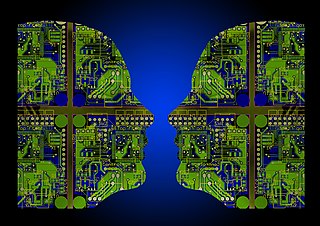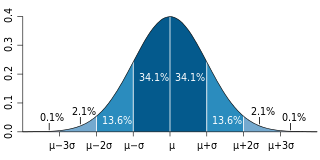In computer science, LR parsers are a type of bottom-up parser that analyse deterministic context-free languages in linear time. There are several variants of LR parsers: SLR parsers, LALR parsers, canonical LR(1) parsers, minimal LR(1) parsers, and generalized LR parsers. LR parsers can be generated by a parser generator from a formal grammar defining the syntax of the language to be parsed. They are widely used for the processing of computer languages.

Recursion occurs when the definition of a concept or process depends on a simpler or previous version of itself. Recursion is used in a variety of disciplines ranging from linguistics to logic. The most common application of recursion is in mathematics and computer science, where a function being defined is applied within its own definition. While this apparently defines an infinite number of instances, it is often done in such a way that no infinite loop or infinite chain of references can occur.

The infinite monkey theorem states that a monkey hitting keys at random on a typewriter keyboard for an infinite amount of time will almost surely type any given text, including the complete works of William Shakespeare. In fact, the monkey would almost surely type every possible finite text an infinite number of times. The theorem can be generalized to state that any sequence of events that has a non-zero probability of happening will almost certainly occur an infinite number of times, given an infinite amount of time or a universe that is infinite in size.
In computer science, a recursive descent parser is a kind of top-down parser built from a set of mutually recursive procedures where each such procedure implements one of the nonterminals of the grammar. Thus the structure of the resulting program closely mirrors that of the grammar it recognizes.

Alan David Sokal is an American professor of mathematics at University College London and professor emeritus of physics at New York University. He works with statistical mechanics and combinatorics.
Generative music is a term popularized by Brian Eno to describe music that is ever-different and changing, and that is created by a system.

Fashionable Nonsense: Postmodern Intellectuals' Abuse of Science, first published in French in 1997 as Impostures intellectuelles, is a book by physicists Alan Sokal and Jean Bricmont. As part of the so-called science wars, Sokal and Bricmont criticize postmodernism in academia for the misuse of scientific and mathematical concepts in postmodern writing.
For other uses, see Chris Wallace (disambiguation).

A random password generator is a software program or hardware device that takes input from a random or pseudo-random number generator and automatically generates a password. Random passwords can be generated manually, using simple sources of randomness such as dice or coins, or they can be generated using a computer.
SCIgen is a paper generator that uses context-free grammar to randomly generate nonsense in the form of computer science research papers. Its original data source was a collection of computer science papers downloaded from CiteSeer. All elements of the papers are formed, including graphs, diagrams, and citations. Created by scientists at the Massachusetts Institute of Technology, its stated aim is "to maximize amusement, rather than coherence." Originally created in 2005 to expose the lack of scrutiny of submissions to conferences, the generator subsequently became used, primarily by Chinese academics, to create large numbers of fraudulent conference submissions, leading to the retraction of 122 SCIgen generated papers and the creation of detection software to combat its use.

The weasel program or Dawkins' weasel is a thought experiment and a variety of computer simulations illustrating it. Their aim is to demonstrate that the process that drives evolutionary systems—random variation combined with non-random cumulative selection—is different from pure chance.

In science, objectivity refers to attempts to do higher quality research by eliminating personal biases, irrational emotions and false beliefs, while focusing mainly on proven facts and evidence. It is often linked to observation as part of the scientific method. It is thus related to the aim of testability and reproducibility. To be considered objective, the results of measurement must be communicated from person to person, and then demonstrated for third parties, as an advance in a collective understanding of the world. Such demonstrable knowledge has ordinarily conferred demonstrable powers of prediction or technology.

Luciano Floridi is an Italian and British philosopher. He is the director of the Digital Ethics Center at Yale University. He is also a Professor of Sociology of Culture and Communication at the University of Bologna, Department of Legal Studies, where he is the director of the Centre for Digital Ethics. Furthermore, he is adjunct professor at the Department of Economics, American University, Washington D.C. He is married to the neuroscientist Anna Christina Nobre.

In common usage, randomness is the apparent or actual lack of definite pattern or predictability in information. A random sequence of events, symbols or steps often has no order and does not follow an intelligible pattern or combination. Individual random events are, by definition, unpredictable, but if there is a known probability distribution, the frequency of different outcomes over repeated events is predictable. For example, when throwing two dice, the outcome of any particular roll is unpredictable, but a sum of 7 will tend to occur twice as often as 4. In this view, randomness is not haphazardness; it is a measure of uncertainty of an outcome. Randomness applies to concepts of chance, probability, and information entropy.

The following list of publications by Richard Dawkins is a chronological list of papers, articles, essays and books published by British ethologist and evolutionary biologist Richard Dawkins.

In computing, a compiler is a computer program that transforms source code written in a programming language or computer language, into another computer language. The most common reason for transforming source code is to create an executable program.
The philosophy of computer science is concerned with the philosophical questions that arise within the study of computer science. There is still no common understanding of the content, aims, focus, or topics of the philosophy of computer science, despite some attempts to develop a philosophy of computer science like the philosophy of physics or the philosophy of mathematics. Due to the abstract nature of computer programs and the technological ambitions of computer science, many of the conceptual questions of the philosophy of computer science are also comparable to the philosophy of science, philosophy of mathematics, and the philosophy of technology.
Criticism of postmodernism is intellectually diverse, reflecting various critical attitudes toward postmodernity, postmodern philosophy, postmodern art, and postmodern architecture. Postmodernism is generally defined by an attitude of skepticism, irony, or rejection towards what it describes as the grand narratives and ideologies associated with modernism, especially those associated with Enlightenment rationality. Thus, while common targets of postmodern criticism include universalist ideas of objective reality, morality, truth, human nature, reason, science, language, and social progress, critics of postmodernism often defend such concepts.
An inforg is an informationally embodied organism, entity made up of information, that exists in the infosphere. These informationally embodied organisms are also called natural agents.
Digital civics refers to a range of ethical and responsible civic behaviours, citizenship, or democratic engagement in the digital realm. The term itself is still establishing currency.











